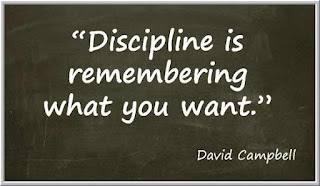In his book 59 Lessons: Working With the World's Elite Coaches, Athletes, and Special Forces, Fergus Connolly makes a very interesting distinction between discipline and self-discipline.
He points to elite special forces troops. When they begin their training as soldiers, they are expected to do what they are told. When their commanding officers give an order, they follow that order. That is discipline.
When that soldier gets to the point of special forces training, however, the situation is different. The challenges faced by special forces operators are complex and ever-changing. They can't possibly rely upon commands from a superior. They have to think for themselves. As Connolly observes,
"...especially as conflict has become much more unconventional, a need has arisen to develop independent operators who can think and act with ingenuity in highly unpredictable situations...there is no such thing as external discipline with elite performers, only self-discipline...Discipline is what you do at the behest of someone else, while self-discipline is when you do it on your own initiative." (p. 184).
So how does this relate to trading?
Many traders look for recurring patterns in markets ("setups") to guide their entries. Examples would include breakouts from ranges, gaps on news or earnings reports, moving average crossovers, etc. Acting on those setups with fidelity is discipline. Traders are doing what they've been taught.
What happens, however, once the trade has been placed? Very quickly the flows of buyers and sellers create a fluid, complex situation not unlike that faced by the special forces operator. Now there are no mechanical setups to act upon. The trader has to think independently about whether to add to positions, scale out, hold for targets, stop out, etc. Responding to those fluctuating conditions requires self-discipline.
I have been impressed in recent years at how many traders generate good ideas and enter positions at good levels. They simply cannot weather the price path once the positions are on. Very often, when we review where they stopped out of positions, we find that the trades ultimately worked out and hit planned targets. The problem was not discipline in finding and entering trades. The problem was the self-discipline required to navigate the trade.
Not every good, disciplined soldier can function as an elite special forces operator. The ability to follow instructions is not the same thing as developing principles and guidelines for navigating fluid, complex, uncertain situations. Discipline is all about "if A, then B". Self-discipline is more about envisioning multiple what-if scenarios and knowing how to respond to each. The disciplined trader takes the break out trade. The elite trader tracks order flow and the flow of buying and selling from the point of breakout and flips the position if those breakout flows are not sustained.
A great deal of trader education emphasizes discipline. Success in financial markets, however, requires self-discipline. The training of traders should look more like the training of elite performers who operate in fluid situations and less like the training of grunts in basic training.
.
He points to elite special forces troops. When they begin their training as soldiers, they are expected to do what they are told. When their commanding officers give an order, they follow that order. That is discipline.
When that soldier gets to the point of special forces training, however, the situation is different. The challenges faced by special forces operators are complex and ever-changing. They can't possibly rely upon commands from a superior. They have to think for themselves. As Connolly observes,
"...especially as conflict has become much more unconventional, a need has arisen to develop independent operators who can think and act with ingenuity in highly unpredictable situations...there is no such thing as external discipline with elite performers, only self-discipline...Discipline is what you do at the behest of someone else, while self-discipline is when you do it on your own initiative." (p. 184).
So how does this relate to trading?
Many traders look for recurring patterns in markets ("setups") to guide their entries. Examples would include breakouts from ranges, gaps on news or earnings reports, moving average crossovers, etc. Acting on those setups with fidelity is discipline. Traders are doing what they've been taught.
What happens, however, once the trade has been placed? Very quickly the flows of buyers and sellers create a fluid, complex situation not unlike that faced by the special forces operator. Now there are no mechanical setups to act upon. The trader has to think independently about whether to add to positions, scale out, hold for targets, stop out, etc. Responding to those fluctuating conditions requires self-discipline.
I have been impressed in recent years at how many traders generate good ideas and enter positions at good levels. They simply cannot weather the price path once the positions are on. Very often, when we review where they stopped out of positions, we find that the trades ultimately worked out and hit planned targets. The problem was not discipline in finding and entering trades. The problem was the self-discipline required to navigate the trade.
Not every good, disciplined soldier can function as an elite special forces operator. The ability to follow instructions is not the same thing as developing principles and guidelines for navigating fluid, complex, uncertain situations. Discipline is all about "if A, then B". Self-discipline is more about envisioning multiple what-if scenarios and knowing how to respond to each. The disciplined trader takes the break out trade. The elite trader tracks order flow and the flow of buying and selling from the point of breakout and flips the position if those breakout flows are not sustained.
A great deal of trader education emphasizes discipline. Success in financial markets, however, requires self-discipline. The training of traders should look more like the training of elite performers who operate in fluid situations and less like the training of grunts in basic training.
Further Reading:




